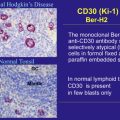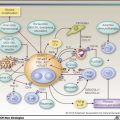Hodgkin lymphoma (HL) is a relatively rare but highly curable human cancer. Because very few patients relapse and will require subsequent therapy, new drug development for HL has not been seen as a high priority by the pharmaceutical industry. Brentuximab vedotin, an antibody-drug conjugate that targets CD30 receptors, became the first drug to be approved by regulatory agencies for the treatment of HL in more than 30 years. This review summarizes the current and future directions of incorporating brentuximab vedotin in the management of patients with HL.
Key points
- •
Brentuximab vedotin, an antibody-drug conjugate that targets CD30, is one of the most active single agents for the treatment of patients with relapsed classic Hodgkin lymphoma.
- •
Brentuximab vedotin should not be combined with bleomycin, as the combination can cause excessive pulmonary toxicity. When combined with front-line ABVD, bleomycin is eliminated from the regimen.
- •
The most common brentuximab vedotin toxicity is cumulative but reversible neuropathy.
- •
Brentuximab vedotin can be safely administered before and after allogeneic stem cell transplant.
Introduction
CD30 is considered an ideal target for monoclonal antibody therapy for Hodgkin lymphoma (HL), because its expression is highly restricted to the malignant Hodgkin and Reed-Sternberg (HRS) cells. CD30 is a transmembrane receptor that belongs to the tumor necrosis factor receptor superfamily. In addition to its membrane-bound form, CD30 can also be shed in a soluble form. Over the past 2 decades, several investigators have evaluated the safety and efficacy of a wide range of monoclonal antibodies targeting CD30 in patients with relapsed HL. Results from clinical trials using a variety of naked monoclonal antibodies targeting CD30 have demonstrated an excellent safety profile, but with limited antitumor activity ( Table 1 ). These disappointing clinical results could be attributed to poor antigen-binding properties of these antibodies, ineffective activation of effector cells, and/or neutralization by high levels of soluble serum CD30.
| Drug | Phase of Study | No. of Evaluable Patients | PR | CR | PR + CR |
|---|---|---|---|---|---|
| MDX-060 | II | 63 | 2 | 2 | 4 (6%) |
| SGN-30 | II | 38 | 0 | 0 | 0 |
| Xmab2513 | I | 13 | 1 | 0 | 1 (7%) |
| SGN-35 (every 3 wk) | I | 42 | 7 | 10 | 17 (40%) |
| SGN-35 (weekly) | I | 35 | 10 | 6 | 16 (46%) |
| Brentuximab vedotin | II | 102 | 41 | 35 | 76 (75%) |
CD30 is internalized, making it a suitable target for antibody-drug conjugate (ADC) treatment strategies. Earlier, custom-made ADCs demonstrated clinical efficacy but also resulted in significant toxicity. More recently, the naked antibody SGN30 was linked to the antitubulin monomethyl auristatin E (MMAE), to generate the ADC brentuximab vedotin (formerly known as SGN35).
Introduction
CD30 is considered an ideal target for monoclonal antibody therapy for Hodgkin lymphoma (HL), because its expression is highly restricted to the malignant Hodgkin and Reed-Sternberg (HRS) cells. CD30 is a transmembrane receptor that belongs to the tumor necrosis factor receptor superfamily. In addition to its membrane-bound form, CD30 can also be shed in a soluble form. Over the past 2 decades, several investigators have evaluated the safety and efficacy of a wide range of monoclonal antibodies targeting CD30 in patients with relapsed HL. Results from clinical trials using a variety of naked monoclonal antibodies targeting CD30 have demonstrated an excellent safety profile, but with limited antitumor activity ( Table 1 ). These disappointing clinical results could be attributed to poor antigen-binding properties of these antibodies, ineffective activation of effector cells, and/or neutralization by high levels of soluble serum CD30.
| Drug | Phase of Study | No. of Evaluable Patients | PR | CR | PR + CR |
|---|---|---|---|---|---|
| MDX-060 | II | 63 | 2 | 2 | 4 (6%) |
| SGN-30 | II | 38 | 0 | 0 | 0 |
| Xmab2513 | I | 13 | 1 | 0 | 1 (7%) |
| SGN-35 (every 3 wk) | I | 42 | 7 | 10 | 17 (40%) |
| SGN-35 (weekly) | I | 35 | 10 | 6 | 16 (46%) |
| Brentuximab vedotin | II | 102 | 41 | 35 | 76 (75%) |
CD30 is internalized, making it a suitable target for antibody-drug conjugate (ADC) treatment strategies. Earlier, custom-made ADCs demonstrated clinical efficacy but also resulted in significant toxicity. More recently, the naked antibody SGN30 was linked to the antitubulin monomethyl auristatin E (MMAE), to generate the ADC brentuximab vedotin (formerly known as SGN35).
Phase I studies
The initial multicenter first-in-man phase I study enrolled 45 patients with relapsed or refractory CD30-positive hematologic cancers, of whom 93% had HL. Although there was no limit to the number of prior regimens, patients were treated with a median of 3 prior regimens, and 73% of the patients had undergone prior autologous stem cell transplantation (ASCT). Patients were treated with escalating doses of brentuximab vedotin (from 0.1 mg/kg to 3.6 mg/kg) in a standard 3 + 3 phase I design. Brentuximab vedotin was administered intravenously, over 30 minutes, every 3 weeks in an outpatient setting. Dose-limiting toxicities included grade-4 thrombocytopenia, grade-3 hyperglycemia, and febrile neutropenia. Based on this phase I study, the recommended dose for the follow-up phase II study was established as 1.8 mg/kg every 3 weeks. Objective responses were observed in 17 patients, including 11 complete remissions (see Table 1 ). When the analysis was restricted to the patients receiving the dose levels of 1.8 mg/kg or greater, 6 of 12 (50%) patients responded, including 4 complete remissions. Using a waterfall plot analysis, tumor regression was observed in 86% of the evaluable patients. The median duration of response was at least 9.7 months.
A second phase I study investigated the safety and tolerability of brentuximab vedotin administered on a weekly schedule for 3 weeks, followed by 1 week of rest. A total of 37 patients (31 had HL) were enrolled and treated. Patients received a median of 3 prior chemotherapy regimens (range 1–8), and 62% previously received an ASCT. The dose-limiting toxicities were grade-3 gastrointestinal (diarrhea and/or vomiting) and grade-4 hyperglycemia. Sixteen (46%) had a major response, with 29% achieving complete remission.
Stay updated, free articles. Join our Telegram channel

Full access? Get Clinical Tree





